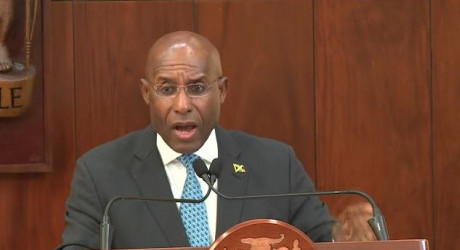.png)
00:00
00:00
00:00
NWU General Secretary Granville Valentine, Development Economist Dr. Chris Stokes and JCTU President Helene Davis Whyte
By Prince Moore
Governor of the Bank of Jamaica Richard Byles is facing backlash from trade unionists for his comment cautioning employers against massive wage increases.
Mr. Byles has said a large jump in salaries could have a negative effect on inflation.
But this has not gone down well with General Secretary of the National Workers Union (NWU), Granville Valentine, who described the utterance as unfortunate and disturbing.
He said the comment comes at a time when unions are seeking to get livable wages for employees.
"[The pronouncement] is clearly indicative and makes it difficult for us when we go to the table, to the risk of the society, private sector and other government institutions, that if we pay more than six or seven per cent then it's going to affect the economy and the inflation is going to be affected in such a bad way. They should have known this when they gave many persons 50, 60, 100, 200, 150 per cent increase. There can't be one law for the rich and the other for the poor," he contended, calling for the BOJ governor to withdraw or explain the statement more clearly to "the ordinary man".
While he acknowledged the BOJ's responsibility to manage inflation, Mr. Valentine questioned whether it was the role of the central bank to "set the tone of what should be paid in a free market system".
The trade unionist said the governor's comment risks creating a rift at the negotiating table between employers and workers' unions, as the employers will now be "guided conveniently" by the governor's statement.
Development Economist Dr. Chris Stokes believes the BOJ governor went outside his remit when he made the comment about salary increases and inflation.
"Because we're not in a central planned economy and wage policy is not the remit of the Bank of Jamaica, but I believe they are right to point out the fact that abnormal increases in wages can drive inflation. Now, whether those increases bring somebody up to a livable wage is another question that needs to be addressed, but that is the basic economic theory behind that."
Still, Dr. Stokes reiterated that "it is not the role of the BOJ to dictate or to prescribe policy in a free enterprise economy".
President of the Jamaica Confederation of Trade Unions (JCTU), Helene Davis Whyte, has said while she understands the theoretical aspect of the BOJ governor's concern, there is a real need for liveable wages in order to attract and retain competent staff.
"The reality is that when you do keep wages low, as was the case and is still the case in Jamaica, you do have other effects as well and you have effects in the society which ends up creating almost a vicious cycle in terms of our ability to be able to have families that are able to survive and just basically keep their heads above water. So while we recognise this economic theory, you cannot only base it on just the theory, you have to look at what is happening in terms of the lived experiences."




_crop.jpg)
.jpg)



.jpg)



 All feeds
All feeds







